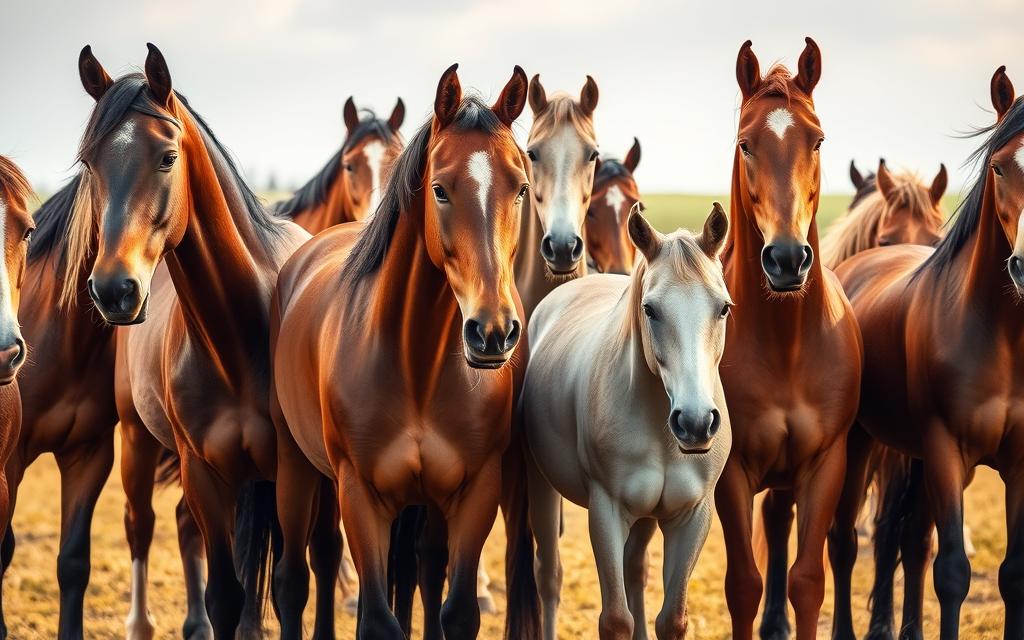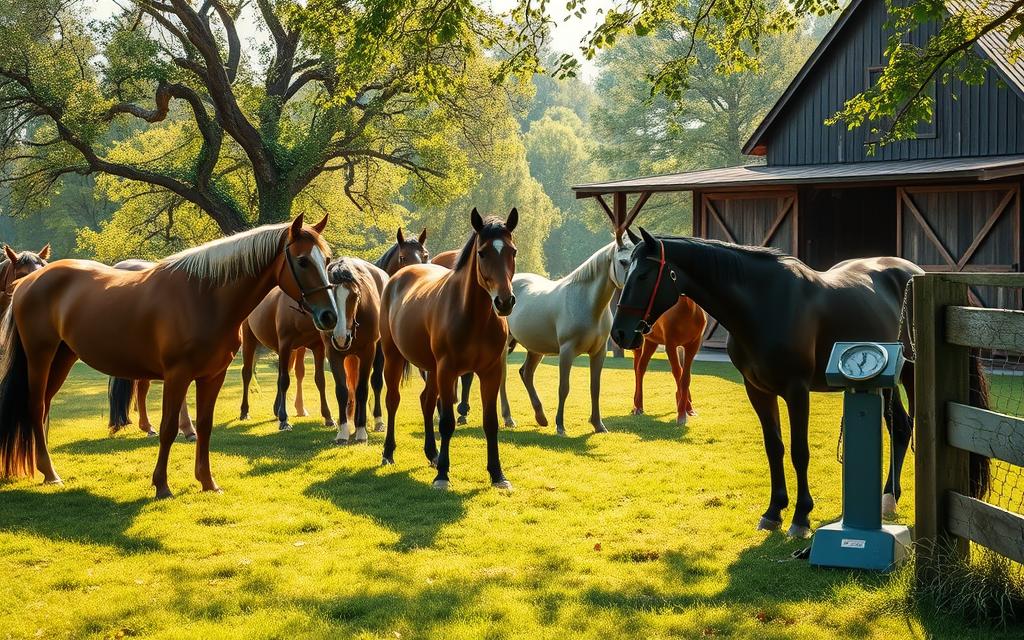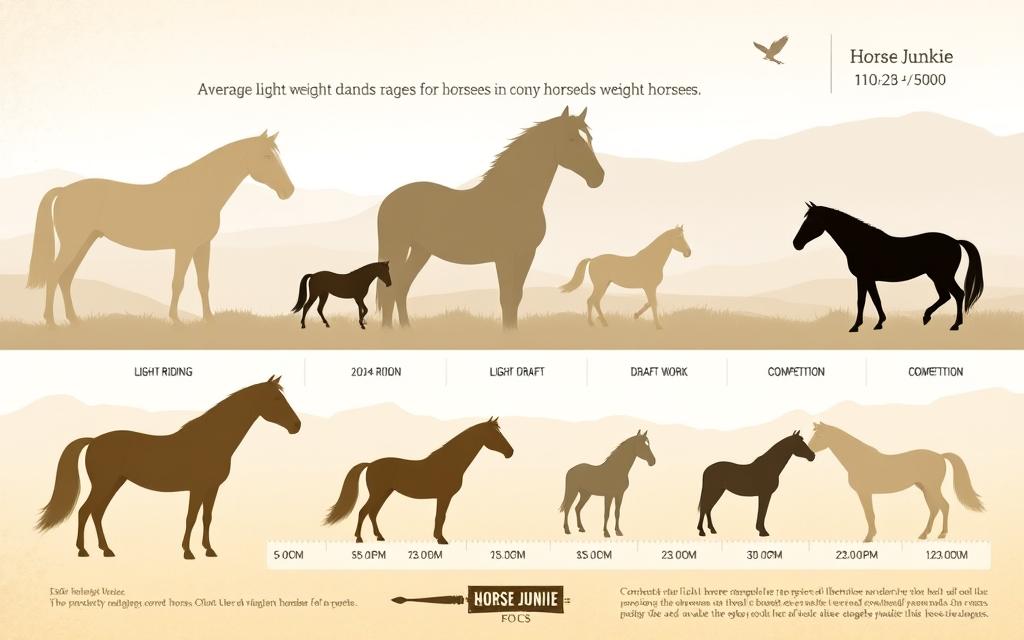Average Horse Weight Insights | Equine Guide

Ever thought about your horse’s perfect weight? Knowing the average horse weight is key for their health and performance. We’ll look at the average weight of horses and what affects it. We’ll cover different breeds, ages, and why managing weight is important.
From tiny ponies to huge draft horses, we want to help horse owners. We aim to give you the knowledge to keep your horse healthy and happy.
Key Takeaways
- The average adult horse weighs between 900 and 1,200 pounds.
- Miniature horses and small ponies typically weigh between 100 to 600 pounds.
- Draft horse breeds can weigh over 1,800 pounds.
- Horses should carry about 15 to 20 percent of their body weight safely.
- Maintaining a Body Condition Score (BCS) of 4 to 6 is ideal for horse health.
- Effective weight management is key to preventing various health issues.
- Understanding your horse’s weight can enhance their overall wellbeing and performance.
Understanding Average Horse Weight
When we talk about average horse weight, it’s key to remember that it changes a lot. This depends on things like breed, age, and health. Horses can weigh from 900 to 2,200 pounds. Knowing these ranges helps us manage equine weight better.
What Is Considered Average?
Different breeds have different weights. For instance:
- Thoroughbreds usually weigh between 900 to 1,200 pounds.
- Clydesdales can be between 1,800 to 2,200 pounds because of their big build.
- Arabian horses usually weigh around 990 pounds.
- Miniature horses, like Haflingers, weigh just over 660 pounds.
- Shire horses, known for their strength, can weigh over 3,300 pounds.
The horse weight measurements show a big difference between breeds. This helps us know what’s healthy for each horse type.
Factors Influencing Horse Weight
Many things affect a horse’s weight:
- Genetics: Some breeds are naturally heavier or lighter.
- Diet: Good food helps horses stay at a healthy weight. Too little or too much food can cause weight changes.
- Exercise: Regular activity helps prevent obesity and keeps muscles strong.
- Age: Young horses grow fast, with foals weighing about 10% of their mother’s weight at birth. They learn to gain weight quickly in their first year.
In short, knowing about the average horse weight helps us take better care of our horses. It promotes their health and performance.
Different Horse Breeds and Their Weights
Knowing the weight of the average horse is key. Each breed has its own look and weight. Most horses weigh between 900 and 2,000 pounds, depending on their size and breed.
Heavier breeds like Belgians and Percherons can weigh 1,700 to 2,000 pounds. Lighter breeds, like Arabians, weigh between 900 to 1,500 pounds. This range shows how different horses can vary in weight.
Popular Breeds and Their Average Weights
Knowing the average weight of popular horse breeds is important for owners. Here are some examples:
- Shetland Ponies: 397 to 441 pounds
- Quarter Horses: 900 to 1,200 pounds
- Arabians: 900 to 1,500 pounds
- Clydesdales: 1,600 to 2,400 pounds
- Shires: 1,543 to 2,646 pounds
This info helps us feed and care for our horses right. It ensures we meet their nutritional needs based on their weight.
How Breed Characteristics Affect Weight
Each breed’s features affect its weight. Lighter breeds are built for speed and agility, leading to lower weights. Arabians and Thoroughbreds are sleek and athletic, making them lighter.
Heavier breeds, like Clydesdales, are strong and muscular. They can handle tough tasks. We need to consider these traits when planning their diet and exercise.

The Importance of Weight Measurement
Knowing a horse’s weight is key to their health. It helps us manage their diet, check their fitness, and adjust their meds. By understanding the weight range, we can give them the care they need.
Why Weighing Your Horse Matters
Keeping track of a horse’s weight is vital. It affects many things, including:
- Health Monitoring: Regular weighing helps spot weight changes that might mean health problems.
- Dietary Adjustments: Knowing a horse’s weight helps us make sure they get the right food.
- Performance Readiness: A horse’s weight affects their speed and energy, important for racing.
Common Methods for Weighing Horses
There are a few ways to weigh a horse:
- Equine Scales: The most accurate method, but not always easy to use every day.
- Weight Tapes: A handy tool that guesses weight by measuring around the girth.
- Body Condition Scoring (BCS): This method lets us quickly check a horse’s health and fat without exact weight.

Weight Ranges for Various Uses
It’s important to know the weight ranges for different types of horses. This knowledge is key for activities and responsibilities with them. Whether we ride or work with horses, understanding their weight ensures we pick the right ones for specific tasks.
Riding Horses: Average Weights
Riding horses usually weigh between 900 and 1,400 pounds. Breeds like Quarter Horses typically fall in this range, weighing 900 to 1,200 pounds. These horses are agile and have stamina, perfect for fun and competitive riding.
Draft vs. Light Horses
Draft and light horses have different weights. Draft horses, like Clydesdales and Percherons, weigh 1,800 to 2,200 pounds. They are built for heavy work, like pulling and plowing. Light horses, on the other hand, weigh 900 to 1,400 pounds. They are great for fun riding and sports.

Nutritional Factors Affecting Weight
It’s key to know what affects a horse’s weight for their health. The diet we give them plays a big role. A good diet should have quality forage, grains, and supplements. These should match their age and how active they are.
Dietary Requirements for Healthy Weight
Horses need at least 1.5% to 2% of their body weight in forage daily. For example, a 1,000 lb. horse needs 15 to 20 lbs. of forage. Sometimes, like with young horses or ponies, they might eat more.
It’s also important to watch their calcium and phosphorus intake. This is especially true when they’re growing or pregnant. The ratio of calcium to phosphorus should be above 1.5:1.
Common Weight Management Practices
There are ways to help manage a horse’s weight:
- Keep an eye on how much they eat and adjust as needed.
- Add legumes and grass hays to their diet for more protein and calcium.
- Make sure they drink enough water, as they need about 2 quarts for every pound of hay.
- Talk to a vet to check their diet and make changes if needed.
By paying attention to these nutritional factors, we can help our horses stay healthy and at a good weight.
Higher-weight and Underweight Horses
It’s key to spot weight problems in our horses for their health. Studies show up to 54% of domestic horses are higher-weight or obese. Knowing how to spot these issues is vital.
A horse’s body condition score (BCS) is a helpful tool. It uses a 9-point scale, with 4 to 6 being ideal. By watching their body condition and other signs, we can act quickly to manage their weight.
Identifying Weight Issues
To check a horse’s weight, we can use weight tapes or equations. One way to estimate weight is by multiplying girth circumference squared by body length and dividing by 330. Horses can gain about 3 pounds a day.
This makes it hard to see weight gain of under 100 pounds in a 1,000-pound horse. So, it’s important to keep track of their weight changes closely.
Consequences of Improper Weight
Not managing weight right can harm our horses’ health. Higher-weight horses risk metabolic disorders, joint stress, and laminitis. Underweight horses might face energy and nutritional shortages.
Underweight horses usually score a BCS of 3 or less. They could have anemia and gastric ulcers. It’s vital to watch their BCS to see if they’re at a healthy weight. Horses with scores of 7 or higher are obese.
We need to stay on top of weight management to avoid these health problems.

The Role of Age in Horse Weight
Understanding how age affects horse weight is key to better care. Horses grow and change weight as they mature. From a newborn foal to a grown adult, their weight varies.
Weight Changes by Life Stage
Young horses grow fast, especially in the early years. Foals, born weighing 100 to 150 pounds, can grow up to 50 to 60 percent of their adult weight by 12 months. By age two, they are about 90 percent of their adult weight.
This fast growth highlights the need for the right food. Weanlings, expected to weigh 1,100 to 1,200 pounds, can gain 1.25 to 2 pounds daily. This shows how important good feeding is during this time.
Young Horses vs. Mature Horses
As horses get older, their growth slows down around five years old. Adult horses keep their weight but may face health issues. These can include dental problems, osteoarthritis, and Equine Metabolic Syndrome.
These problems can cause weight changes. It’s crucial to watch for these changes. Regular vet visits, especially for older horses, help catch issues early. This ensures our horses stay healthy and at the right weight.

Weight and Performance: A Correlation
Understanding the link between horse weight and performance is key for anyone in equine activities. The weight of the average horse can greatly affect its athletic ability. Heavier horses might struggle in speed races, while lighter ones often have an edge.
Knowing the right weight for competitive horses can boost their performance in events.
How Weight Impacts Athletic Ability
Studies reveal that a horse’s weight affects its workload and performance. Horses carrying extra weight tend to run slower and have higher heart rates. It’s important to consider the average horse weight when preparing for races.
Overweight horses face health risks and may perform poorly. Effective weight management helps performance horses stay at their best weight. This ensures they excel in their events.
Ideal Weight for Competitive Horses
Finding the ideal weight for competitive horses is complex. Breed, age, and competition type all play a role. For events, keeping a horse’s weight right supports agility and stamina.
We use body condition scoring and ultrasonography to check fat levels. This ensures each horse is ready for top performance. Finding the right balance between average weight and competition needs promotes health and efficiency.

Seasonal Weight Fluctuations
Seasonal changes are key to our horses’ health and weight. Weather affects forage quality and availability, impacting their weight and condition. Understanding these changes helps us manage our horses’ weight all year.
How Weather Affects Weight
Temperature changes greatly affect horse weight. Cold weather increases their need for calories to stay warm. We might need to add 2,000 kilocalories for every 10°F drop in temperature.
This can lead to weight gain if we’re not careful. Horses usually gain weight in autumn and winter. Their weight often drops in summer, especially in male and gelding horses.
Seasonal Diet Adjustments
Adjusting their diet is crucial for stable weight across seasons. In spring, horses naturally gain weight due to warmer temperatures and better forage. We need to ensure their diet meets their energy needs.
A balanced diet with 50-100% forage helps manage weight. High-fat supplements might be needed for extra calories in harsh weather. Knowing these seasonal trends helps us tailor their diet for optimal weight health.

Monitoring Weight Effectively
Keeping our horses at the right weight is key for their health. Regular checks help us spot any weight issues early. This ensures they stay healthy. There are many tools and methods to track a horse’s weight accurately. Having a good weight management plan is essential for their well-being.
Tools for Tracking Average Weight
There are several ways to measure a horse’s weight accurately. Here are some of the most effective tools:
- Weight Tapes: While easy to use, weight tapes can be off by up to 200 pounds, especially for bigger horses.
- Veterinary Scales: These give the most accurate readings and help check the accuracy of other methods.
- Estimating Formulas: A common formula uses girth and body length: girth x girth x body length ÷ 330 to estimate an adult horse’s weight.
- Body Condition Scoring Systems: Systems like the Henneke method rate horses from 1 (poor condition) to 9 (obese), helping us manage their weight.
Creating a Weight Management Plan
Creating a weight management plan is crucial for our horses’ health. This plan should include:
- Regular Weigh-Ins: Weighing our horses every two weeks helps us track changes accurately.
- Body Condition Assessment: Using the Carroll and Huntingdon system (0-5) and the Henneke system (1-9) helps us evaluate our horse’s condition and adjust their diet or exercise.
- Diet and Exercise Adjustments: Tailoring our horses’ diets and exercise programs based on their individual needs helps avoid health issues from being overweight.
- Educational Resources: Providing informative leaflets and videos on effective weight monitoring enhances our knowledge and awareness.
Professional Guidance for Weight Management
Managing a horse’s weight needs careful attention and knowledge. It’s crucial to work with a vet or equine nutritionist, especially if your horse’s weight changes a lot. Keeping an eye on your horse’s overall health is key to managing their weight.
When to Consult an Equine Veterinarian
If you notice big changes in your horse’s health, it’s time to see a vet. This includes:
- Significant weight loss or gain beyond normal seasonal variations.
- Altered eating habits, including decreased appetite or unusually increased thirst.
- Changes in activity level, such as lethargy or refusal to engage in regular exercise.
Your vet can help figure out the right weight for your horse. They’ll create a plan just for your horse. For example, never cut a horse’s food too low without a vet’s say-so.
Recognizing Signs That Help Us
Spotting early signs of trouble is important for your horse’s health. Look out for:
- Notable alterations in body condition or muscle tone, which affects overall equine weight.
- Behavioral changes during feeding or exercise, suggesting discomfort or pain.
- Increased incidents of injury or fatigue while riding or training.
Acting fast on these signs can help keep your horse healthy. Working with experts helps make sure your horse gets the right food. It also helps avoid injuries from sudden changes in diet or exercise.
Conclusion: Understanding Our Horses’ Weight
Knowing what affects a horse’s weight is key for their health. Factors like breed, age, and how much they work impact their weight. Keeping their weight right helps them stay healthy and perform better.
Final Thoughts on Weight Management
It’s best to aim for a Body Condition Score (BCS) of 4 to 6 for most horses. Since about 58% of horses are overweight, it’s important to watch their weight closely. Adjusting their diet and exercise can keep them at a healthy weight, preventing obesity-related health problems.
The Importance of Ongoing Monitoring
Watching our horses’ weight regularly is crucial. Visits to the vet or a nutritionist can help us keep their weight in check. By always monitoring and managing their weight, we ensure they stay healthy and perform well for years to come.
FAQ
What is the average weight of a horse?
How does breed affect a horse’s weight?
Why is monitoring horse weight important?
What factors influence a horse’s weight?
How can I measure my horse’s weight accurately?
What weight range is typical for riding horses?
How does a horse’s diet affect its weight management?
What are the signs of overweight or underweight horses?
How does a horse’s weight change with age?
How does a horse’s weight impact its performance?
How do seasonal changes affect a horse’s weight?
What tools can help in monitoring a horse’s weight?
When should I consult a veterinarian about my horse’s weight?
Source Links
- How much does a horse weigh? (Fun facts, calculator, FAQs)
- How Much Does a Horse Weigh | How Much Does a Average Horse Weigh
- How Much Does a Horse Weigh? | Strathorn Farm Stables
- How Much Does a Horse Weigh? — The Equine Institute
- How Much Does a Horse Weigh?
- How Much Does a Horse Weigh? With Breed Chart | PangoVet
- How Much Does a Horse Weigh | How Much Does a Average Horse Weigh
- Horse Height & Weight: A Guide
- A Comprehensive Guide on How Much Does A Horse Weigh
- How much does a horse weigh?
- How Much Does a Horse Weigh? Find Out Now!!!
- Nutritional Requirements of Horses and Other Equids – Nutritional Requirements of Horses and Other Equids – Merck Veterinary Manual
- The Basics of Equine Nutrition
- Creating the Right Mix: Understanding Nutrients in a Horse’s Diet
- Equine Body Condition: From Too Fat to Too Thin to Just Right
- Your Horse’s Body Condition: Too Much, Too Little, or Just Right?
- Weight: is your horse the right weight? – World Horse Welfare
- What’s Age Got to Do with It? Caring for Geriatric Horses
- Managing Young Horses for Sound Growth – Oklahoma State University
- Impacts of Adiposity on Exercise Performance in Horses
- Seasonal fluctuations in body weight during growth of Thoroughbred racehorses during their athletic career – BMC Veterinary Research
- Springtime Weight Gain in Horses – Cherokee Feed & Seed
- Why You Should Know Your Horse’s Weight – KPP
- Weight: is your horse the right weight? – World Horse Welfare
- Estimating a Horse’s Body Weight | Integrity Horse Feed
- Equine Weight Management
- Guidelines for weight-carrying capacity of horses
- Weight: is your horse the right weight? – World Horse Welfare
- Horse Weight Factors and Importance | American Horse Trails
- How to Measure a Horse’s Height & Weight in 3 Easy Ways
- When is my horse too fat?



